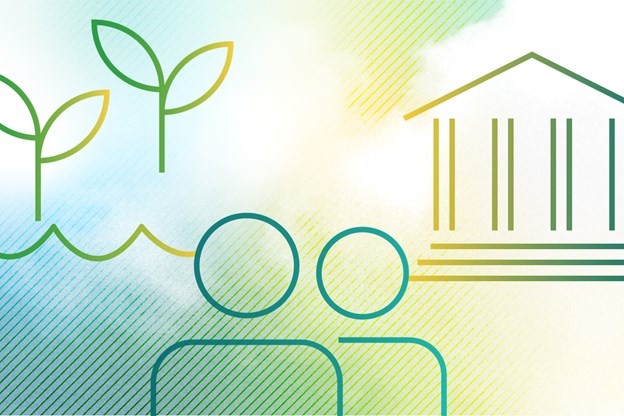Ruth Saldanha: There is no question that the social aspect of environmental, social and governance or ESG investing has gained significant traction in 2020. It began with worker rights, especially the rights of the generally minimum wage frontline workers during the pandemic. The spotlight then moved to "Black Lives Matter" in the wake of George Floyd's horrific murder which was mirrored by similar issues here in Canada. However, the social aspect of ESG investing has been in the minds of many Canadian investors, mostly surrounding the rights of indigenous peoples who have been facing off with Canadian energy and mining companies for decades now. Last week Vancouver-based mutual fund company, Leith Wheeler, funded research by SHARE into the best due diligence practices for investors to assess free, prior and informed consent compliance when engaging with indigenous communities. Andrew Hoffman, Vice President and Portfolio Manager at Leith Wheeler Investment Counsel, is here today to talk about this.
Andrew, thank you so much for being here today.
Andrew Hoffman: Thank you for having me.
Saldanha: To begin with, what are some ways Canadian investors may be exposed to indigenous rights issues?
Hoffman: Yeah, that's a good question. In the resource industries such as oil and gas exploration and transportation, as well as mining, less and less investors will see a company engaging in an activity that infringes on the rights of indigenous peoples directly. More and more what we are seeing is large companies taking minority interests in junior companies, a company entering into a joint venture with another company or simply one company acquiring another company. And what investors need to understand is that when these transactions occur, the targeted industry or project becomes the history of the acquirer. And that comes with both good and bad.
Saldanha: What are some Canadian companies that are exposed to these indigenous rights issues through independently managed operations or these indirect holding structures that you mentioned?
Hoffman: Well, you don't hear a lot about the transactions that go well and there are many examples of that. For example, ATCO Industries constructed a 500-kilometer transmission line in Alberta. It was completed in 2019 on time and on budget, and not much more is heard about it. But what you do hear and read about are the ones that don't go so well. A few examples would be Enbridge via their minority stake in the Dakota Access Pipeline project. This is the Standing Rock dispute. TC Energy or what used to be called TransCanada PipeLines via their Coastal GasLink project which is a link between Northeastern gas fields and LNG port in Kitimat BC. This is the issue with the Wet'suwet'en hereditary chiefs not being consulted. And Franco-Nevada who entered into an agreement with a company called Taseko for a portion of gold production from the New Prosperity mine in BC and in that case, the affected nation was the Tsilhqotʼin. These are just a few examples.
Saldanha: These issues are oftentimes complex. What are some tips for individual investors to help them keep abreast of these issues?
Hoffman: Well, it's challenging, but in addition to reviewing public disclosures by companies and its business partners, investors may request specific information about how these companies incorporate indigenous rights considerations into their due diligence process and operations. And from that, hopefully, investors can make a decent assessment. There are no guarantees but what investors should be looking for is a demonstration to commit to the process of protecting indigenous rights. And in the case of this report, we're talking about free, prior and informed consent. There are specific questions within the report that can help guide investors to that end.
Saldanha: If investors should choose to do so, how can they take action on these issues?
Hoffman: Well, by the very nature of being an investor, you are an owner of the business, and with that comes rights. And the investor's voice is the ability to vote for or against management, management's compensation, the board of directors and its composition, et cetera. And as an investor you can choose to use this right, or you can invest with a manager that takes issues involving the environment, social issues and governance seriously.
Saldanha: Finally, based off of the findings of this report what actions will Leith Wheeler take in your energy and mining holdings? How will you address indigenous rights issues in your portfolios?
Hoffman: Yeah, that's a really big question. Responsible investing has been something that my firm has been a part of for the last 40 years now and the focus has always been about protecting our investors, our clients. We look to companies that manage their environmental footprint. We look for businesses with good safety records and protocol and management committees that are having their compensation tied to it. We want the best for our investors and since diversity has been proven to be an important ingredient in the best-in-class decision making, we want that too. And prior to 2015 when the Truth and Reconciliation Commission first came out with its findings, diversity may have been the only aspect of indigenous rights that my firm recognized. But now, it is much more formalized as a part of our responsible investing framework. And I'm saying this to acknowledge the fact that responsible investing is a process, it's a journey and it's not an absolute.
And shining light on free, prior and informed consent saying that indigenous peoples have the right to self-determination is a cornerstone of the United Nations Declaration on the Rights of Indigenous People or UNDRIP as well a cornerstone of the Truth and Reconciliation Commission's findings and something that we feel very important that investors should understand and companies operating in these sensitive sectors should also understand as well. And that's kind of a good final point is that we do not want to exclude businesses from our investment horizon. We want the best opportunities to look at for our clients. And so, it's important for us that all businesses out there understand their responsibility and therefore funding this report through SHARE was so important to us.
Saldanha: Thank you so much for joining us today with your perspectives, Andrew.
Hoffman: Thanks again for having me.
The rules of responsible investing
Understand how ESG regulations affect investors and managers in our latest report








.jpg)












